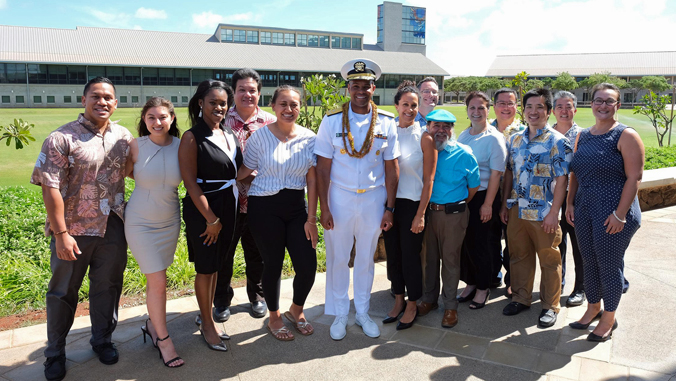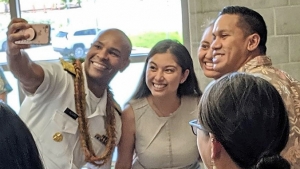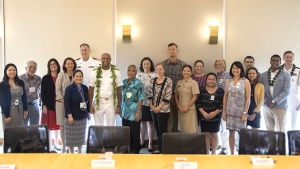
Students and faculty at the University of Hawaiʻi–West Oʻahu and the UH Mānoa John A. Burns School of Medicine (JABSOM) met the U.S. Surgeon General during his recent visit to the state. Dr. Jerome Adams was in Hawaiʻi to address the National Medical Association conference.
The surgeon general is known as the “nation’s doctor” and oversees the commissioned corps of the U.S. Public Health Service, which is made up of more than 6,000 uniformed public health officers. Adams was appointed surgeon general in 2017 and his motto is “better health through better partnerships.”
UH West Oʻahu

Adams was welcomed to UH West Oʻahu with a Native Hawaiian protocol and the singing of Mele Honouliuli by summer bridge students. He thanked them for their greeting and took a selfie with the students from schools on Hawaiʻi Island and along the Waiʻanae Coast.
“You guys are the right-now,” Adams said, explaining that he had attended a summer bridge program once and that they have the power to change the trajectory of healthcare.
During Adams’ visit, the campus highlighted its health science programs, which address community and workforce needs. UH West Oʻahu will inaugurate new concentrations focusing on health careers in fall 2019, including Hawaiian and indigenous health and healing, health information management, long-term care and health professions. The campus has concentrations in respiratory care, healthcare administration and community health.
“We are not trying to get a seat at the table,” said Ric Custodio, a long-time pediatrician and health science program chairman. “We are building the table. We believe that if we create new, innovative, health science bachelor-level degrees of the future, we can transition our first generation, low-income students into marketable and sustainable healthcare careers.”
Kauʻi Baumhofer, UH West Oʻahu assistant professor of indigenous health science, also gave a presentation.
For more go to E Kamakani Hou.
John A. Burns School of Medicine

At JABSOM Adams spoke to Hawaiʻi’s future doctors as though he was addressing his colleagues, instead of medical students. “Use your voice,” he urged them, emphasizing that doctors are among the most trusted people in America.
He zeroed in on a rising local trend—the dangerous spike in the use of e-cigarettes by high schoolers. “Hawaiʻi is the second-highest state in the country for youth using e-cigarettes. One pod contains as much nicotine as a pack of cigarettes. We have a new generation of youth becoming slaves to nicotine,” said Adams.
He voiced concern about the normalization of marijuana: “CBD oil is not regulated. You might think you’re getting this, but maybe you’re getting a little of the oil and the rest is, I don’t know what.”
Adams addressed national issues as well. “Our poor health isn’t just a matter of diabetes, cancer and heart disease. We’re literally a less safe country now because we’re not healthy. Oral health is one of the reasons soldiers get sent home from deployment.”
He asked those in the JABSOM auditorium to look at themselves, saying, “People don’t prioritize health. How many times have you skipped a workout or skipped a meal for work? Then we turn around and look at patients and say, ‘What’s wrong with you? Why aren’t you prioritizing your health?’”
Adams is a strong advocate for preventive care. He also knows the vicious toll substance abuse takes on individual health and families, citing his own brother’s struggle with addiction. He said that, just by walking around Waikīkī during his brief Hawaiʻi stay, he could see signs of opioid addiction, and he urged everyone in healthcare to have the overdose antidote Naloxone handy.
After his talk, Adams listened to community health advocates in a round table discussion involving JABSOM and other UH faculty who are active in health locally and throughout the Pacific region, including members of the Pacific Islands Primary Care Association, Pacific Island Health Officers Association, Kokua Kalihi Valley Community Health Center and We Are Oceania.
For more go to the JABSOM website.

